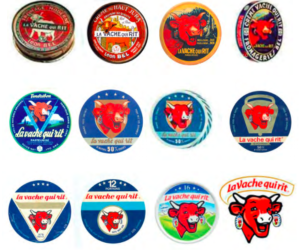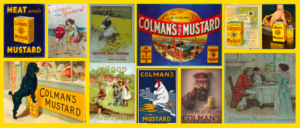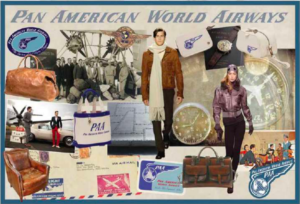There’s more to The Laughing Cow than the iconic red image. We caught up with Richard Pink of Pink Key Licensing – exclusive licensing agent for the brand in the UK – to talk pink cows, pop art and plans for the future.
[divider style=”solid” top=”20″ bottom=”20″]
Hi Richard, how has the last year been for you, business-wise?
It’s been a tough year for everyone: we’ve tried to work with our licensees and support them through the problems they have had to deal with, including Covid, and the ensuing challenges of fractured supply chains and increased freight costs, and to be as flexible as we can. The Laughing Cow and some of the other brands we have such as Kellogg’s, Pringles, Vimto and SLUSH PUPPiE are the kind of brands that people gravitate to in troubled times because they’re so familiar; they’re ones we’ve all grown up with. Consequently, things have not been too bad, but I think the licensing industry more than any other thrives on social interaction and we’ve all missed that enormously.
So, we’re all looking for things to cheer us up?
Definitely. After being locked down for so long, all we were hearing from people was ‘We really need a laugh’, and we can’t think of a licence that conveys laughter better than The Laughing Cow does. So, while we’ve hopefully come through the worst, the brand has a certain resonance about it for these times.
The red cow image is instantly recognisable. But what else is there to the brand?
The red cow itself is iconic, but outside of that, there’s so much imagery to play with. You’ve got vintage artwork that dates back to when the brand first came to fruition a century ago, right the way through to pop art and contemporary imagery – there’s such a vast range available and it works on so many different levels.
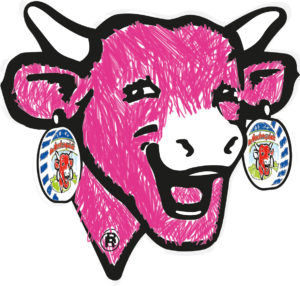 Some brands don’t have the flexibility to allow you to adapt the imagery, they have quite stringent rules in terms of what you can and can’t do. But we love The Bel Group (owners of The Laughing Cow) because they are so open to ideas. When we first took on The Laughing Cow and we said to them, ‘We’d love a pink cow’, they had no problem with that!
Some brands don’t have the flexibility to allow you to adapt the imagery, they have quite stringent rules in terms of what you can and can’t do. But we love The Bel Group (owners of The Laughing Cow) because they are so open to ideas. When we first took on The Laughing Cow and we said to them, ‘We’d love a pink cow’, they had no problem with that!
What plans do you have for The Laughing Cow in the UK?
It’s had a solid licencing programme in Europe for quite some time and one of the reasons we wanted to take it on is because even though it’s a French brand it has an enormous affinity with the UK consumer. It’s got a great history in the UK and is very recognisable, so we knew it would work.
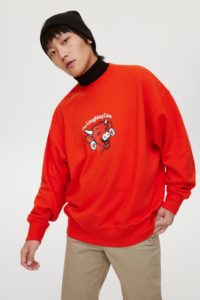 Because of the close association with food The Laughing Cow is always going to lend itself to kitchen and food related products, but if you start looking at some of the Laughing Cow’s quirky imagery, it also really lends itself to apparel and gifting. In a similar way to Kellogg’s, it can potentially benefit from being part of a number of trends that seem to come and go such as vintage, logos and – most obviously – food.
Because of the close association with food The Laughing Cow is always going to lend itself to kitchen and food related products, but if you start looking at some of the Laughing Cow’s quirky imagery, it also really lends itself to apparel and gifting. In a similar way to Kellogg’s, it can potentially benefit from being part of a number of trends that seem to come and go such as vintage, logos and – most obviously – food.
And in the long term?
We are still keen to sign new brands, but you can see from our portfolio that they have to fit what we do. We are lucky enough to represent the rights of some brands that are distributed globally. They all have longevity and great stories behind them, and they’re going to be around for a long time. We only work with brands that we love, and they have to be brands that need to be managed the way we do it. We try and build brand programmes in a methodical way, going for the ‘bullseye’ products and categories that fit the nature of the brand most closely, because we think that this is the best way to manage the type of brands we have for the long term.
If you are interested in talking to Pink Key about licensing The Laughing Cow you can contact Richard at richard@pinkkey.co.uk






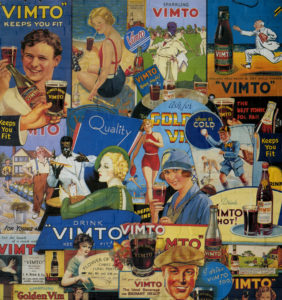 Vimto is a brand with real pedigree. Nationally renowned and proudly from the North, it also has a proven licensing pedigree.
Vimto is a brand with real pedigree. Nationally renowned and proudly from the North, it also has a proven licensing pedigree. If you are interested in talking to
If you are interested in talking to


